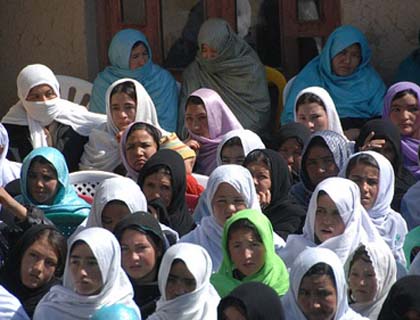KABUL - Afghan authorities are failing to enforce the law to protect women from murder, beating, rape and other violence and being sold into marriage and prostitution, the United Nations said on Wednesday. U.N. Assistance Mission in Afghanistan (UNAMA) revealed in a report that only a small number of cases of violence against women have been prosecuted under the Elimination of Violence Against Women law, passed more than two years ago.
Prosecutors in Afghanistan filed indictments in 155 cases of 2,299 estimated incidents of violence against women, the U.N. mission said in the report.
In just 101 cases was the law used for eventual judgments.
Although use of the law was "clearly growing, there is a very long way to go before Afghan women are fully protected from violence," Navi Pillay, the United Nations High Commissioner for Human Rights, said in a statement.
Women had few rights under the harsh rule of the Taliban, who were ousted in 2001, and an improvement in the lot of women has been a top priority of Western backers of the government of President Hamid Karzai, who has ruled since then.
The law, passed in August 2009, supports equality for women, including criminalizing child and forced marriage, selling and buying women for marriage or for settling disputes, as well as forced self-immolation -- women setting themselves on fire -- among other acts.
But police, prosecutors, governors and other officials have done little to enforce the law, the U.N. mission said in the report.
Some cases were withdrawn. Some murder cases, for example, were instead prosecuted under sharia law, which sometimes resulted in acquittal of the perpetrators or lighter sentences.
In other cases, the female victims themselves were in turn accused of so-called moral crimes. Low numbers of women police, a lack of women's shelters and overuse of mediation in areas such as domestic violence also discouraged women from filing complaints.
The U.N. mission recommended raising awareness of the law among all levels of government and officials and to train prosecutors, police and judges on how to apply the law.
In addition, weaknesses in the law, such as the failure to offer protection to woman who run away from home to escape abuse and are then detained for "moral crimes," needed to be amended.
UNAMA cited cases where the law was or should have been used, including that of two sisters, 15 and 17, who were killed in Herat province in July, 2010, after the elder sister refused to marry an older man.
The future husband and father-in-law were sentenced to 16 years in prison while three other people were acquitted.
In central Daikondi province, a prosecutor used the law to challenge a verdict by a court that found two girls impregnated by a 60-year-old religious leader guilty of adultery. An appeals court rejected that challenge, the U.N. mission said.
A woman in Kandahar province complained in March of her daughter's forced suicide. She said her daughter, who had been sold into marriage for $6,600, set herself on fire in her room when, after 10 years of the marriage, her in-laws forced her to have sex with three male guests visiting the family.
"She was always saying that she would burn herself one day. I would tell her, please tolerate, this is life as it comes and one day you will have a bright future," the mother complained, according to the report. Police did not investigate.
The report was based on 261 interviews and research with judicial, police and government officials as well as U.N. monitoring of cases of violence between March 2010 and September 2011. UNAMA said comprehensive statistics are impossible to obtain since most cases go unreported. (Reuters)

